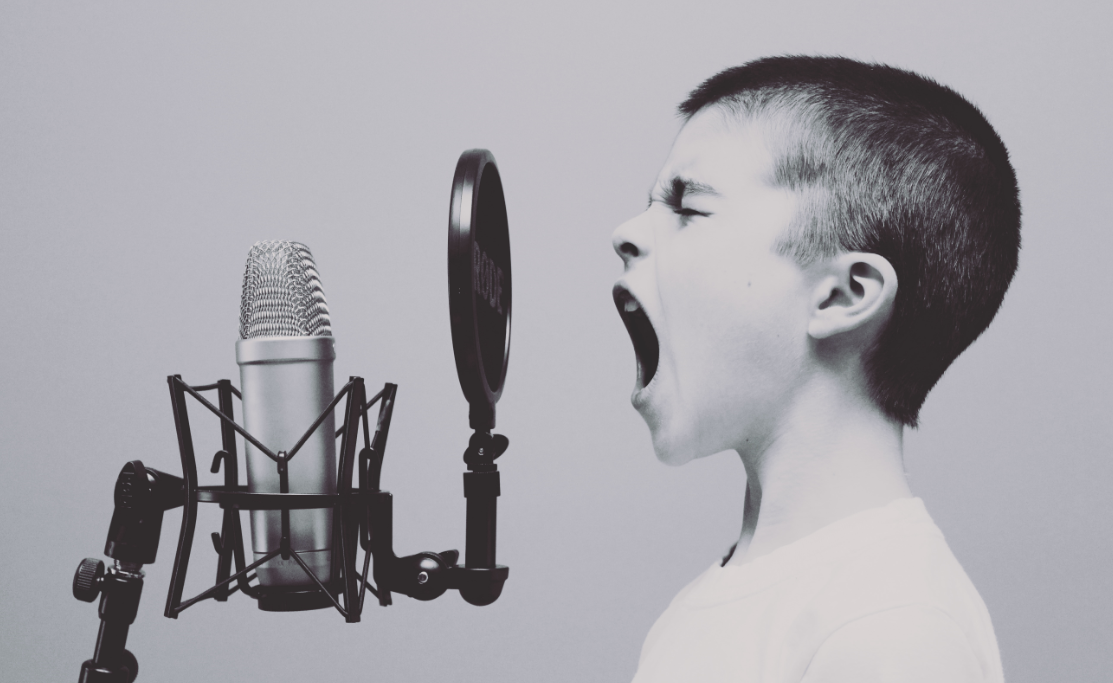Origin of Glossophobia
Fear is a defense mechanism of our body. We’re scared when we feel that our life is at risk. It’s obvious that people are afraid of wild animals, heights, fire, spiders, and many other things. But is this fear equal to that we feel before going onstage? What’s in common?
It comes to a psychological reaction that manifests itself in physiological signs. They’re shivering, being short of breath, sweating, hesitation, memory issues, etc. In case a person is scared, their organism produces a high level of adrenalin. It may provoke one of the three reactions: flight, fight or freeze. When we stand behind the curtains waiting for our turn to perform, the first one is obviously odd. If a person’s response to fear is readiness to fight, reading this article is useless. Thus, when facing a fear of performing, a person usually becomes numb.
This fear can be easily explained. In ancient times, those being brave enough to speak in public, were either supported and became chiefs or were killed by current leaders. In medieval times the situation was the same, public speech resulted in a triumph or made a person’s head hang on the fence. Attempts to express one’s own thoughts were always extreme. Nowadays, people’s lives don’t depend on the result of their performance. In most counties, everyone can freely express their ideas without the fear of being punished. But still, almost everyone has this feeling of anxiety. It’s in our DNA as a kind of natural defense mechanism. And it comes as no surprise that many people feel scared to speak in front of a big crowd. In psychology, the absence of fear can be considered as a sign of pathology. So, calm down, your fear makes you a mentally healthy person!
Verbal vs Non-Verbal Communication
A person broadcasts only 7% of meaning verbally. Other things are transmitted with the help of non-verbal communication. It means that you share 93% of information using your body and voice. That’s why there are a number of tips for speakers to behave and manage their body to be more efficient and impactful on stage. Still, both communication sides are equally important.
Read more: How to Master Public Speaking: Tips from World-Famous Speakers.
Verbal Aspect
Never write down the text of your speech and learn it beforehand. It can result in a collapse as soon as someone asks you a question or distracts your attention. You won’t be able to continue. It’s better to make a plan and add some notes to each point. It will make your performance agile. Everyone enjoys improvisation.
Non-Verbal Aspect
Your body speaks a unique language. It does it even if you don’t even think of it. The best way to be efficient on stage is to control your body. You should know the ways your body interacts with other people. If you keep them in mind, it’s easier to manage the way people will comprehend your ideas. They may not be aware of their meaning but they will either trust or despise you unconsciously.
Hush: Your Personality Is Speaking
Voice is a tool that allows your personality to manifest itself. It’s the way to let the world know you exist and have your opinion, ideas, and worldview.
The main parameters of voice are loudness, tone, and speed. By adjusting them, you can either worsen or improve your performance and manage people’s reactions.
Loudness
Loudness forms a personality perception stereotype. According to it, people speaking loudly are self-confident, wise, and strong. On the contrary, people speaking quietly, are perceived as unconfident, shy, and incompetent. But in reality, it’s not like this. In psychology, both quiet and loud voices are considered as a kind of psychological abuse. A person having a quiet voice may not realize it but the way they speak affect their listeners. Can you imagine yourself sitting in a large crowded auditorium trying to recognize and interpret what a speaker is talking about when there are other voices and noises around? Your body becomes tense focusing on a source. On the contrary, a person speaking too loudly also makes the audience feel constrained and nervous. Loud sounds provoke irritation and switch on our defense mechanisms. It also negatively affects the delivery of our ideas. In both cases, a speaker can’t be called good and such a performance can’t be efficient. A listener should feel comfortable to perceive information adequately.
Tone
Tone is the pitch of a sound. When speaking, a person can add different meanings to the same word by varying their tone. Tone is responsible for visualizing a text in a listener’s mind. Everything pronounced with a low pitch is perceived as huge, heavy, serious, and impactful. And vise versa, the same word pronounced with a high pitch, is regarded as small, funny, inessential. Just try to pronounce the word “stone” using various pitch. Makes difference, doesn’t it? Keep it in mind when performing. Sometimes people use a high pitch unconsciously to sound more friendly. But the truth is nobody wants their onstage discourse to be perceived as something pointless and foolish if it’s not a stand-up comedy performance. And your audience doesn’t want to listen to the memorial speech, so speaking with a low tone is a bad idea, too. The main rule is keeping balance.
Speed
Speed is a significant property as well. It can ruin your performance or improve it, make it more alive. Never talk too quickly, even if you have time limits. It’s better to tell less with adequate speed than to try to tell everything without caring if people can understand you and perceive the flow. And at the same time, slow speaking makes your audience fall asleep. Always consider the meaning of what you’re going to say and adjust your speed. Semantics is essential. Never be monotonic. Be different, and people will remember you.
Components in Total
All these components should be applied as a whole when giving a speech. And remember they all should vary during the performance. They all make your speech more vivid and interesting. Such an approach to delivering a speech will demonstrate your expertise and self-confidence. And finally, this method will make your listeners engaged and perceive your ideas just like you want them to.
Ways Fear Can Affect Your Voice
Apart from the above mentioned physiological reactions like sweating, shivering, and feeling dizzy, your voice can show the audience that you’re afraid. When you suddenly start speaking too quietly or too loudly, or maybe too quickly, it’s a sing of your psychological reaction. But fear can also provoke some mechanisms in your organs’ systems which will result in an inability to produce sounds. And it’s about a physiological response. It appears when you’re on stage. That’s why it’s impossible to get prepared for it. The only way you can help yourself is keeping a glass of water nearby. It should be of room temperature because both too cold or too hot liquid can cause bigger problems with your vocal apparatus. Take a deep breath and have a drop of water.
Overcoming Fear
We suggest the following ways of overcoming any fear:
- Realizing
- Exercising
- Depreciating
Realizing
The resolution of any problem should be initiated with its realization. To overcome it, a person must be completely aware of all aspects of the issue they’re facing. Clearly imagine the worst result of your performance and then ask yourself a number of questions like “Will I lose this job?”, “Will it ruin my life?”, “Will I be unhappy all my lifetime?”, “Will people memorize my face forever?”
Obviously, an onstage failure can’t have such negative consequences. So first and foremost, realize that your life won’t change after that day. It will definitely help you to manage your fear.
Exercising
Psychologists are sure that if a person wants to get rid of their fear, they must face it. They have to step outside their comfort zone and take a risk to see that nothing harms their health and that their lives aren’t dependent on a stressor. If you’re afraid of speaking a foreign language, use any chance to speak it. If you feel scared to death finding yourself on stage, volunteer and do it as often as possible. Besides, additional exercises can be helpful: try various improvisation techniques to test your communication skills. You can practice them at the office or at home, with your colleagues, relatives, or a psychologist.
Depreciating
Depreciating is a method of ignoring your fear or making fun of it. For example, if you’re afraid of public speaking, you can imagine your audience wearing red clown noses. It makes your psyche calm down because any person feels comfortable when laughing. Despite the effectiveness of this technique it’s very rarely applied as a way to overcome the fear of speaking. The reason is simple: you cannot disrespect the people you’re speaking to, otherwise, they won’t perceive your speech. Any disregard is clearly demonstrated by non-verbal signs. Apply this technique if worst comes to worst.
And if your voice deceitfully demonstrates your anxiety, just apologize, calm down and continue. One more way to solve this situation is to make a joke out of your fear. People like self-irony.
We believe that the most important thing you should remember if nothing helps is that your audience consists of ordinary people who can have fears, too.
Do you have your own methods of eliminating stress and fear?



